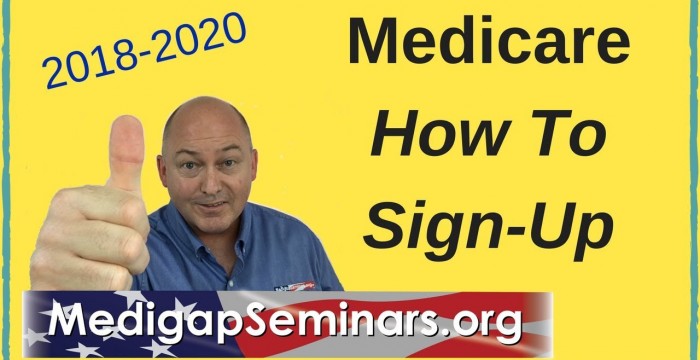How to Sign Up For Medicare. Enroll in Medicare / Medicare enrollment when New to Medicare. In this video, we review how to sign up for Medicare Part A and Medicare Part B. By the end of this video presentation, you will know how to sign up for Medicare, When to sign up for Medicare and whether or not you qualify to sign up for Medicare online.
Call Us 1-800-847-9680
Visit our YouTube channel:
Visit our website:
First; when you sign up for Medicare what are you signing up for?
When you first sign up for Medicare you will be signing up for Medicare Part A and/or Medicare Part B.
Medicare Part A is that part of your Medicare health insurance that is used when you are an inpatient in a medical facility like a hospital, nursing facility or hospice. Or, if you are unable to travel and must have home healthcare. That is all covered under Medicare Part A. I am not going to go into detail about the different parts of Medicare in this video, or discuss copays and deductibles. That’s for a separate video.
What I want you to know for this video is that
1. Medicare Part A is hospital inpatient insurance only. It is not the Medicare coverage you use when you visit a doctor.
2. This is also the Medicare you paid for out of payroll taxes. That’s that 1.45% tax that comes out of your paycheck. That pays for Medicare Part A.
3. As long as you or your spouse paid that tax for at least 10-years, you qualify for Medicare Part A and your Medicare Part A is free. No additional costs.
You are not required to sign up for Medicare Part A when you turn 65 and there are no late penalties if you qualify for Medicare Part A.
Because your Medicare Part A it is already paid for, there is no reason not to sign up for Medicare Part A when you are eligible. It does not interfere with other health insurance and it cost you nothing to have it.
Medicare Part B is health insurance for Outpatient and Physician services. This is the health insurance you use when you visit a doctor or get tests done.
Medicare Part B is not free and it was not paid for by your Medicare payroll tax. You have a monthly premium for Medicare Part B. That monthly premium is based on your income. It’s based on your adjusted gross income as of 2-years ago.
That’s the What. Now we get into the when and how.
I know that learning this part of Medicare can be a bit confusing. Medicare has a lot of rules. So, to help you understand all you need to know very quickly, I am going to break down or separate Medicare rules with their exceptions. As they say, every rule has its exceptions. It’s those exceptions that often lead to confusion.
First understand that Medicare rules are meant to apply to everyone. Everyone should pay attention to the rules.
Exceptions only apply to select groups of people. If the exception does not apply to you, then set that thought aside. Don’t concern yourself with it and just focus on the rule.
Medicare rule #1: you have a 7-month window to sign up for Medicare. That window is based on the month of your birthday. It includes the month of your birthday, the three calendar months before your birthday and the three calendar months after your birthday.
Medicare rule #2: Medicare starts the first day of the month you turn 65.
Using those two rules, let’s look at an example. Let’s say your birthday is April 20th.
If your birthday is April 20, then Medicare starts April 01.
Your 7-month window will include the month of April, it will include the three months before your birthday month – that’s January, February and March. Plus it includes the three months after your birthday month which is May, June and July.
So if your birthday is April, you have from January to the end of July to enroll in Medicare. That is called your Medicare initial enrollment period.
That applies to everyone.
Get your Medicare Guide to supplements here: …
And your Medicare & You Guide here: …
for Part D drug plan info visit:
Also visit :







I like your demeanor , style, tone and great information.
Thank you Russell
Thank you very much for a very informative, very clear instruction regarding medicare application.
You are welcome. Please know you can call or email me with any questions. 800-847-9680 [email protected]
Enjoyed learning about medicare, didn’tHave a clue how to sign up. Will be looking at some of your other videos!
Thank you Sue
I too did not have a clue about this and you made everything very clear for me to understand, especially as I am an immigrant from the UK where we have a very different system.Thank you!
You are welcome!
This was extremely helpful. You explain things very clearly. I will be looking at your other videos,Here is my question: I turn 65 in 8 months. I am still employed so I want to delay Part B. My employer pays my medical premium 100%. I am confused about the “creditable coverage.” You said that you can start Part B anytime. I thought you still had to start Part B during an official enrollment period. If not, does “any time” truly mean whenever I want? Is there no waiting period? And no penalty? I don’t want to be caught with no Part B coverage when I do decide to retire.
Sandra, thank you for your kind words. You have a great question on a subject that does confuse a lot of people. Assuming your employer has at least 20 employees (smaller companies have different rules), you can delay enrolling in Medicare Part B and Part D indefinately, as long as you have creditable group-health coverage. Virtually all employee based health coverage is creditable. You can then enroll in Medicare Part B at any time. The only stipulation is that Medicare Part B always starts on the first day of a month. You get your own SEP (Special Enrollment Period) that you can initiate at any time. If you lose your group health insurance, you then have an 8-month window to enroll in Medicare. This is important because your guarantee enrollment into a Medigap Plan is predicated on your Part B start date. You can find more detail in the Special Circumstances section on this web page: https://www.medicare.gov/sign-up-change-plans/get-parts-a-and-b/when-sign-up-parts-a-and-b/when-sign-up-parts-a-and-b.html
You explained it very well thank you
You are welcome!
I turn 65 on April 1st. I work full time and my employer pays 100% of my insurance. I do not receive SS and dont plan on receiving until I turn 66. My employer has less plan 20 employees do I need to sign up for part B? Everything else was very information and helpful
Hi Kathleen. Thank you for your question. I touch on the subject at the 8:40 mark with “Exception #3”, but I see where I could have been more clear. You will need to get both Medicare Part A and Medicare Part B because Medicare will be your primary insurance. Your employee health insurance will be secondary, kind of like a supplement but not as good. I do not know the quality of your coverage (deductibles, copays and network). However, you may consider negotiating with your employer to take you off group healthcare and provide funds to purchase a Medicare supplment. It is very, very likely that this will save your employer money while also providing you with better healthcare coverage. https://www.medicare.gov/sign-up-change-plans/get-parts-a-and-b/should-you-get-part-b/should-i-get-part-b.html#collapse-3156 “The employer has fewer than 20 employees. You should sign up for Part A and Part B when you’re first eligible. In this case, Medicare pays before your other coverage. Learn more about how to get Parts A and B.
Note
If you don’t enroll when you’re first eligible, you may have to pay a Part B late enrollment penalty, and you may have a gap in coverage if you decide you want Part B later.”
I will turn 65 August 27, 2018, so I guess I can sign up on June 1, 2018. I am receiving social security under my deceased husband’s benefits. Will I automatically be enrolled in Part A when I turn 65? Also, I am retired from my employer, but have stayed enrolled in the medical plan by paying a high monthly premium. The employer offers a supplemental insurance plan after turning 65 with comparable coverage. Does that qualified as credible coverage and considered Part B or do I need to sign up for Part B?
Hi Trudy. Thank you for your questions. I cannot give personal advice over YouTube. Please feel free to call me at 800-847-9680 during the week. I will be happy to personally answer your questions.
Thanks for the useful information. Are the rules the same for Federal employees. Please direct me to your video(s) that address this topic.
Good simple info, clearly explained for someone new to all of this confusing stuff.
Thank you, Barbara. It’s important that you have and understand all the information you need to make an informed decision. That’s my goal in my videos and with my clients.
Excellent information that is well presented . Thanks.
You are welcome, Jack.
Very well presented… best I’ve heard so far….I do have a question though… at the end when u were talking about the HSA account….my question…. so even with part A you cannot contribute to an HSA? My husband is turning 65 June 1st… so we should stop the HSA now?
Hi Chatty, thank you. I am glad you found this video helpful. I hope you subscribe and watch my other videos too. I also have a few more coming soon. You understood correctly, once your Medicare Part A starts you cannot contribute to an HSA account. See page 27 of this Medicare publication: https://www.medicare.gov/pubs/pdf/11036-Enrolling-Medicare-Part-A-Part-B.pdf
you have been the most help. very clear. thank you
Thank you Kathleen
Very good information in my preparation for medicare. Thanks so much!!!
Very good but still don’t know if I should sign up for Med Part B. I am employed and not sure when I will retire, If I give my employer the standard 2 weeks notice, when will I be covered by Med Part B.
Have you continued on to this video? https://youtu.be/t5OEsLXGiC4
very informative